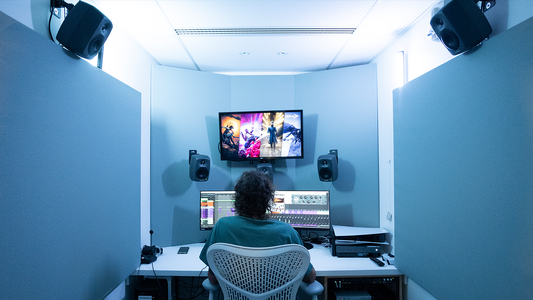
Before I make a game, hire someone, work for someone, design something (or have someone design something)… before I task someone with coding something or illustrating something I need the team to know the kind of games we make, why, and of course how.
This post is about one way I communicate all of that to everyone at my studios. Not with lecture, but with posters on the walls that describe a philosophy and a set of values. The games benefit, teams benefit, and it will even help create the kind of culture I, at least, want to create.
DEVELOPMENT THOUGHTS
HEALTH FAMILY WORK
Maybe the most important thing I’m going to say here is this – we no longer live in a world where people work until they drop, out of love for what they’re doing, commitment to quality or because they’re forced to by management that has screwed up.
The three things on this poster are critical to a good life – not sufficient, but necessary, not a guarantee, but a condition. You can put the first two – health and family -- in either order (though I put health first because, if you’re not taking care of yourself, can you really take care of anyone else?). The important thing is that work always comes last.
ONE NEW THING
Games are not a solved problem in the sense that movies and books are. We’re nowhere near what we can and should be.
That being the case, EVERY game – even a My Little Pony game - should have one thing (MAYBE two...) that no gamer has ever seen or done before.
ASK QUESTIONS – DON’T ANSWER THEM
If you want to tell people what you think, linear media are for you. Let users interpret what you say and agree or disagree. In a game, we can ask players how THEY feel and let them answer through their unique play choices.
Disney Epic Mickey – which is, incredibly, coming back 14 years after we originally shipped – asked several questions, the most important of which was is it more important to be alone but powerful or weak with friends to help?
Deus Ex – still going strong 24 years after its ship date - asked a bunch of questions, too, but that game’s most important ones were what would the world be like if everything was shades of grey? And what was the right future for humanity?
I wish I could tell you the questions my current game-in-progress is going to ask players to ponder, but rest assured they’re good ones!
The key is that WE don’t answer the questions. Players do. No one will ever know what I think is “right.” Each player answers that for themselves.
In DX players still argue about what the “right” future is for humankind. They still argue about the "right" playstyle in Epic Mickey.
Choice isn’t just about playstyle and in-game effects – it’s about what you, as a human sitting in front a screen, feel about what the game is asking you. It’s what we do that no other medium in human history has ever done.
HONOR COMMANDMENTS
Someone has to own what I call the “Creative Box” – the constraints within which everyone works, the ideas that drive the player experience. Talking about the Creative Box in any detail has to wait for another time. Every game has its own. But there’s a core layer that, for me, transcends an individual game. There are things every game I work on is going to do.
Here are some example commandments. Someday I’ll dive into more detail on each of these, but not right now. This is already too long!
Always Show the Goal
Problems not Puzzles
No Forced Failure
It’s About Varied Character Interaction
Players Do; NPC’s Watch
Reward Players Regularly
Players Get Smarter and the Game Will Get More Challenging
Think 3D - Geometry will contribute to gameplay
Routes Will Be Interconnected - Locations will be reachable in several ways
Problems Will Have Multiple Solutions
Players Will Surprise Themselves AND Us
SET PRIORITIES AND QUALITY BARS (KNOW WHERE TO SETTLE)
For my projects I set clear high-level goals and break them down into four categories. When you think about scoping, as you inevitably must, this approach tells you what’s scopable and what’s not. Like a newspaper article, when you run out of room, you cut from the bottom!
The new thing(s) we’re NOT going to compromise or cut, no matter how hard. We’re GOING to do this at the highest level of quality.
We want to beat the competition - be better than our comps.
We want to match player expectations. If players expect a level of quality in an aspect of a game, meet expectations, but you don’t have to reinvent every wheel.
These are the nice to haves. If we don’t quite hit the quality bar of our comps we're okay.
AS MUCH AS YOU CAN, NOT AS LITTLE AS YOU HAVE TO
There are teams that believe it’s enough to say, “we’ve done what we had to, no more no less – we hit expectations. That's good enough” Great games aren’t made that way.
We want to approach development with an eye toward doing as much as we can. Seems obvious, but I’ve seen teams do the opposite of obvious and it doesn’t go well.
NOT MVP – MPG
I hate the Minimum Viable Product concept.
"Minimum” shows contempt for players – they’ll settle for something. “Viable” says it isn’t as good as it could or should be. “Product” says we make widgets.
I prefer Maximum Possible Game.
“Maximum” because we want to give players as much as we can. “Possible” because we strive for the highest level of quality. “Game” because we make games – not widgets.
WE’LL SHOW THEM!
Find something frustrating in another game or games? The thing that has you yelling “why did they DO that?” Find something you know you can and MUST do better. Then fight for a great improvement. My favorite motivator.
LEADERS – BE THE STUPIDEST PERSON IN THE ROOM, BUT…
Never be the smartest person on your team. Hire people better than you are. Leave them as much space as you can to contribute to the Commandments. Let them own execution.
Your job is to contribute and guide, but most important is to safeguard the vision by defining and enforcing the commandments and questions.
That said, make sure you have one more vote than everyone else on the team, combined. You’re ultimately responsible and have to have the final word. And THAT said, if you ever have to use that vote, it’s your failure, not your team’s.
TELL YOUR LEAD THEY’RE FULL OF IT AT LEAST ONCE A WEEK
If you’re a member of a team, rather than a leader of one, be sure to tell your lead they’re full of it at least once a week. The lowliest newb on your team should be able to tell the Creative Director when they’re doing something stupid.
Because they do. And because good leaders need to be comfortable shooting down bad ideas no matter where they come from. Even their own.
Open, honest, consequence-free communication is key to success.
DESIGN THOUGHTS
This one’s simple. In a “player powered” game like the ones we make at OtherSided and the ones I’ve made before, it’s our job to put players front and center. THEY’RE the stars of the show, not us.
If you’re showing how clever and creative YOU are, you’ve failed. Our games are about letting players show how clever and creative THEY are, not us.





































